A Comprehensive Report on the Principles of Catholic Social Thought
VerifiedAdded on 2022/09/23
|8
|1628
|25
Report
AI Summary
This report provides a comprehensive overview of the principles of Catholic Social Thought (CST). It begins by introducing CST as a framework rooted in the belief of God's plan for justice and love, emphasizing its relevance from domestic to international issues. The report then delves into the core principles, including Human Dignity, which underscores the inherent value and rights of every person as created in God's image; Solidarity, which promotes the idea of global interconnectedness and responsibility for one another; and the Common Good, which highlights the importance of community and societal structures that enable all individuals to thrive. The role of government is also discussed, emphasizing its moral function and the principle of subsidiarity. Furthermore, the report explores the relationship between self and community within the context of CST, highlighting the concept of flourishing, the social nature of human beings, and the importance of mutual well-being for both individuals and society. The report concludes by summarizing the significance of CST as a framework for human dignity, justice, and social well-being, emphasizing its call for respecting human liberation, social justice, and the interconnectedness of self and community. The report is a student contribution and is available on Desklib.
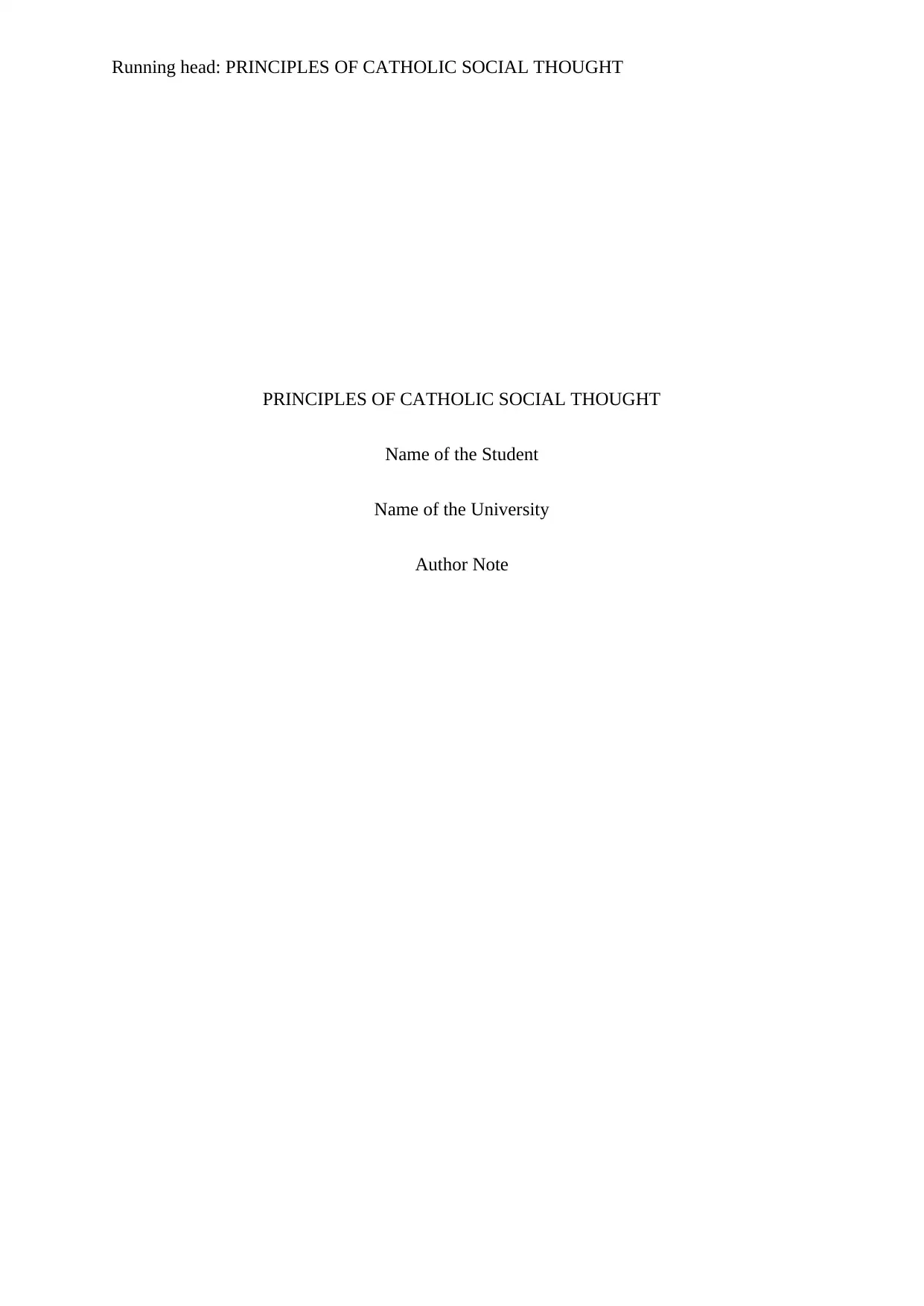
Running head: PRINCIPLES OF CATHOLIC SOCIAL THOUGHT
PRINCIPLES OF CATHOLIC SOCIAL THOUGHT
Name of the Student
Name of the University
Author Note
PRINCIPLES OF CATHOLIC SOCIAL THOUGHT
Name of the Student
Name of the University
Author Note
Paraphrase This Document
Need a fresh take? Get an instant paraphrase of this document with our AI Paraphraser
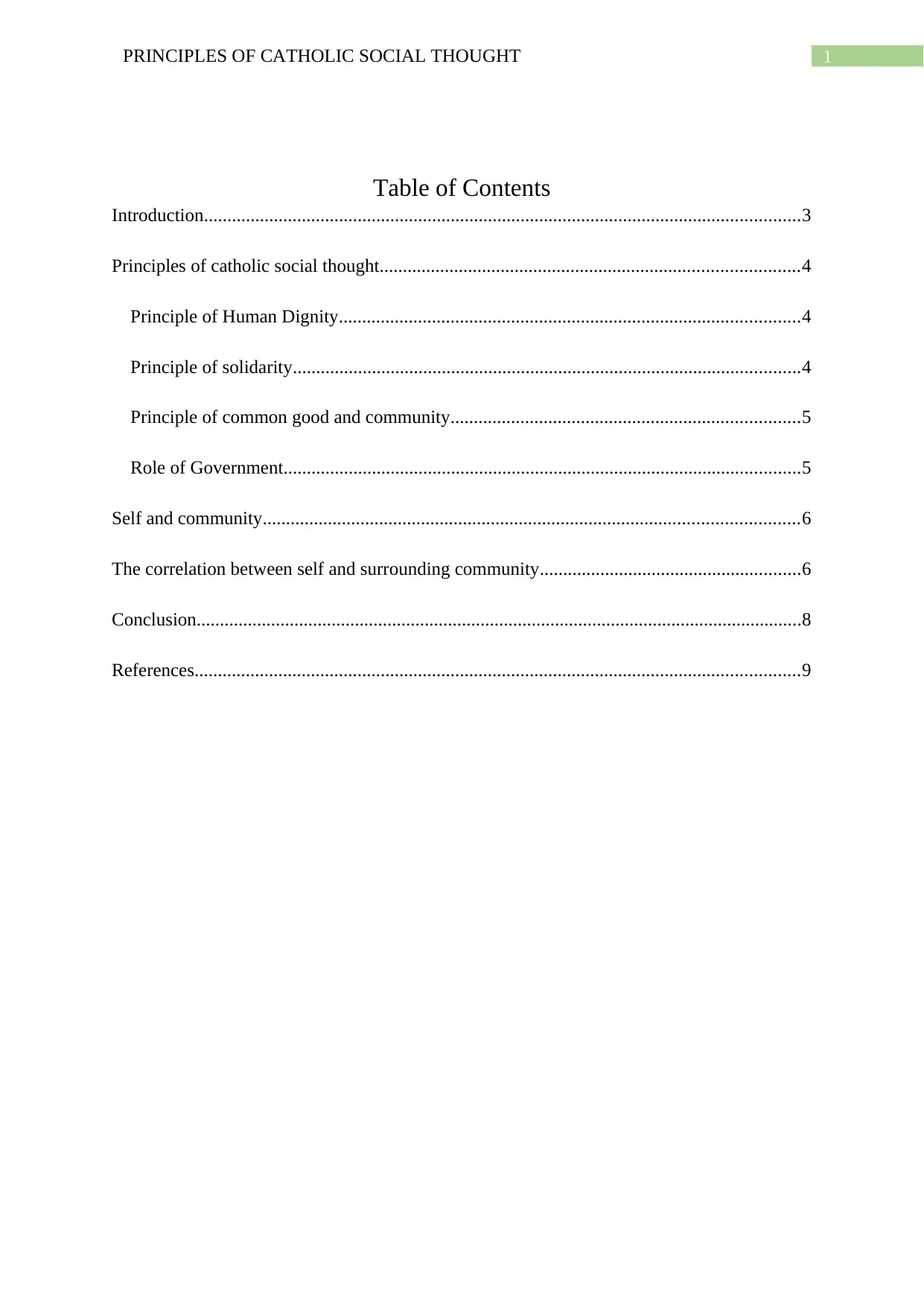
1PRINCIPLES OF CATHOLIC SOCIAL THOUGHT
Table of Contents
Introduction................................................................................................................................3
Principles of catholic social thought..........................................................................................4
Principle of Human Dignity...................................................................................................4
Principle of solidarity.............................................................................................................4
Principle of common good and community...........................................................................5
Role of Government...............................................................................................................5
Self and community...................................................................................................................6
The correlation between self and surrounding community........................................................6
Conclusion..................................................................................................................................8
References..................................................................................................................................9
Table of Contents
Introduction................................................................................................................................3
Principles of catholic social thought..........................................................................................4
Principle of Human Dignity...................................................................................................4
Principle of solidarity.............................................................................................................4
Principle of common good and community...........................................................................5
Role of Government...............................................................................................................5
Self and community...................................................................................................................6
The correlation between self and surrounding community........................................................6
Conclusion..................................................................................................................................8
References..................................................................................................................................9
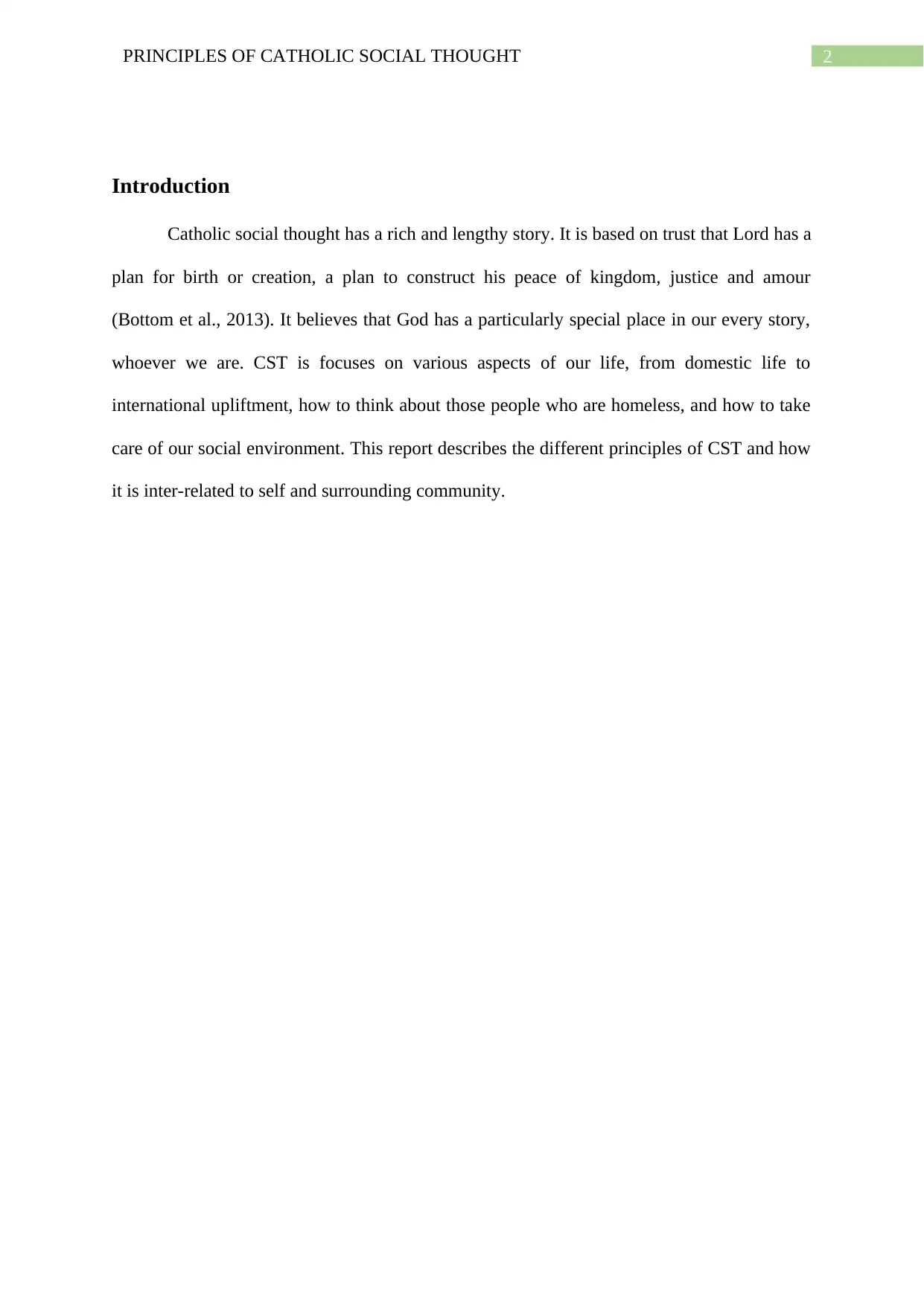
2PRINCIPLES OF CATHOLIC SOCIAL THOUGHT
Introduction
Catholic social thought has a rich and lengthy story. It is based on trust that Lord has a
plan for birth or creation, a plan to construct his peace of kingdom, justice and amour
(Bottom et al., 2013). It believes that God has a particularly special place in our every story,
whoever we are. CST is focuses on various aspects of our life, from domestic life to
international upliftment, how to think about those people who are homeless, and how to take
care of our social environment. This report describes the different principles of CST and how
it is inter-related to self and surrounding community.
Introduction
Catholic social thought has a rich and lengthy story. It is based on trust that Lord has a
plan for birth or creation, a plan to construct his peace of kingdom, justice and amour
(Bottom et al., 2013). It believes that God has a particularly special place in our every story,
whoever we are. CST is focuses on various aspects of our life, from domestic life to
international upliftment, how to think about those people who are homeless, and how to take
care of our social environment. This report describes the different principles of CST and how
it is inter-related to self and surrounding community.
⊘ This is a preview!⊘
Do you want full access?
Subscribe today to unlock all pages.

Trusted by 1+ million students worldwide
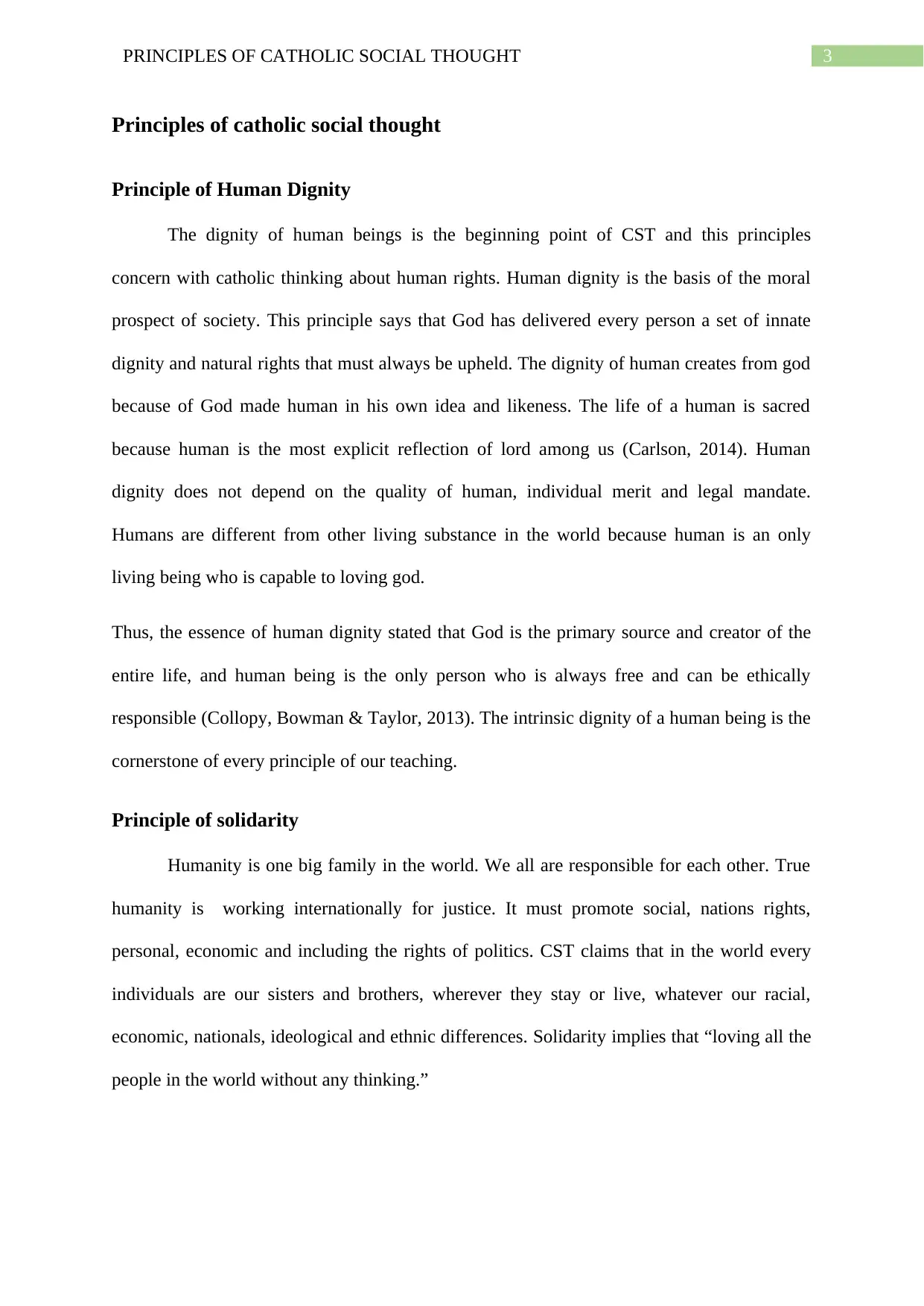
3PRINCIPLES OF CATHOLIC SOCIAL THOUGHT
Principles of catholic social thought
Principle of Human Dignity
The dignity of human beings is the beginning point of CST and this principles
concern with catholic thinking about human rights. Human dignity is the basis of the moral
prospect of society. This principle says that God has delivered every person a set of innate
dignity and natural rights that must always be upheld. The dignity of human creates from god
because of God made human in his own idea and likeness. The life of a human is sacred
because human is the most explicit reflection of lord among us (Carlson, 2014). Human
dignity does not depend on the quality of human, individual merit and legal mandate.
Humans are different from other living substance in the world because human is an only
living being who is capable to loving god.
Thus, the essence of human dignity stated that God is the primary source and creator of the
entire life, and human being is the only person who is always free and can be ethically
responsible (Collopy, Bowman & Taylor, 2013). The intrinsic dignity of a human being is the
cornerstone of every principle of our teaching.
Principle of solidarity
Humanity is one big family in the world. We all are responsible for each other. True
humanity is working internationally for justice. It must promote social, nations rights,
personal, economic and including the rights of politics. CST claims that in the world every
individuals are our sisters and brothers, wherever they stay or live, whatever our racial,
economic, nationals, ideological and ethnic differences. Solidarity implies that “loving all the
people in the world without any thinking.”
Principles of catholic social thought
Principle of Human Dignity
The dignity of human beings is the beginning point of CST and this principles
concern with catholic thinking about human rights. Human dignity is the basis of the moral
prospect of society. This principle says that God has delivered every person a set of innate
dignity and natural rights that must always be upheld. The dignity of human creates from god
because of God made human in his own idea and likeness. The life of a human is sacred
because human is the most explicit reflection of lord among us (Carlson, 2014). Human
dignity does not depend on the quality of human, individual merit and legal mandate.
Humans are different from other living substance in the world because human is an only
living being who is capable to loving god.
Thus, the essence of human dignity stated that God is the primary source and creator of the
entire life, and human being is the only person who is always free and can be ethically
responsible (Collopy, Bowman & Taylor, 2013). The intrinsic dignity of a human being is the
cornerstone of every principle of our teaching.
Principle of solidarity
Humanity is one big family in the world. We all are responsible for each other. True
humanity is working internationally for justice. It must promote social, nations rights,
personal, economic and including the rights of politics. CST claims that in the world every
individuals are our sisters and brothers, wherever they stay or live, whatever our racial,
economic, nationals, ideological and ethnic differences. Solidarity implies that “loving all the
people in the world without any thinking.”
Paraphrase This Document
Need a fresh take? Get an instant paraphrase of this document with our AI Paraphraser
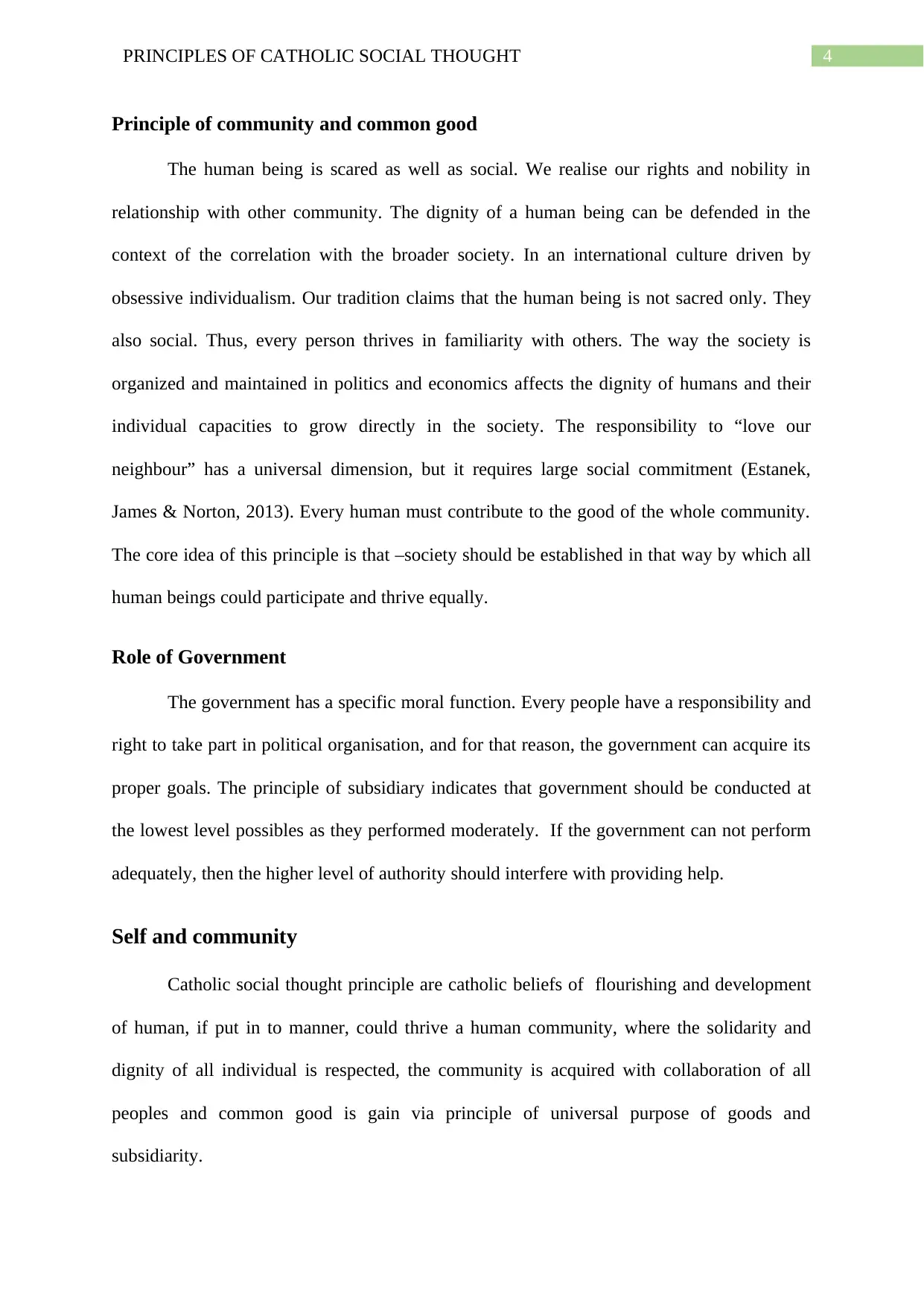
4PRINCIPLES OF CATHOLIC SOCIAL THOUGHT
Principle of community and common good
The human being is scared as well as social. We realise our rights and nobility in
relationship with other community. The dignity of a human being can be defended in the
context of the correlation with the broader society. In an international culture driven by
obsessive individualism. Our tradition claims that the human being is not sacred only. They
also social. Thus, every person thrives in familiarity with others. The way the society is
organized and maintained in politics and economics affects the dignity of humans and their
individual capacities to grow directly in the society. The responsibility to “love our
neighbour” has a universal dimension, but it requires large social commitment (Estanek,
James & Norton, 2013). Every human must contribute to the good of the whole community.
The core idea of this principle is that –society should be established in that way by which all
human beings could participate and thrive equally.
Role of Government
The government has a specific moral function. Every people have a responsibility and
right to take part in political organisation, and for that reason, the government can acquire its
proper goals. The principle of subsidiary indicates that government should be conducted at
the lowest level possibles as they performed moderately. If the government can not perform
adequately, then the higher level of authority should interfere with providing help.
Self and community
Catholic social thought principle are catholic beliefs of flourishing and development
of human, if put in to manner, could thrive a human community, where the solidarity and
dignity of all individual is respected, the community is acquired with collaboration of all
peoples and common good is gain via principle of universal purpose of goods and
subsidiarity.
Principle of community and common good
The human being is scared as well as social. We realise our rights and nobility in
relationship with other community. The dignity of a human being can be defended in the
context of the correlation with the broader society. In an international culture driven by
obsessive individualism. Our tradition claims that the human being is not sacred only. They
also social. Thus, every person thrives in familiarity with others. The way the society is
organized and maintained in politics and economics affects the dignity of humans and their
individual capacities to grow directly in the society. The responsibility to “love our
neighbour” has a universal dimension, but it requires large social commitment (Estanek,
James & Norton, 2013). Every human must contribute to the good of the whole community.
The core idea of this principle is that –society should be established in that way by which all
human beings could participate and thrive equally.
Role of Government
The government has a specific moral function. Every people have a responsibility and
right to take part in political organisation, and for that reason, the government can acquire its
proper goals. The principle of subsidiary indicates that government should be conducted at
the lowest level possibles as they performed moderately. If the government can not perform
adequately, then the higher level of authority should interfere with providing help.
Self and community
Catholic social thought principle are catholic beliefs of flourishing and development
of human, if put in to manner, could thrive a human community, where the solidarity and
dignity of all individual is respected, the community is acquired with collaboration of all
peoples and common good is gain via principle of universal purpose of goods and
subsidiarity.
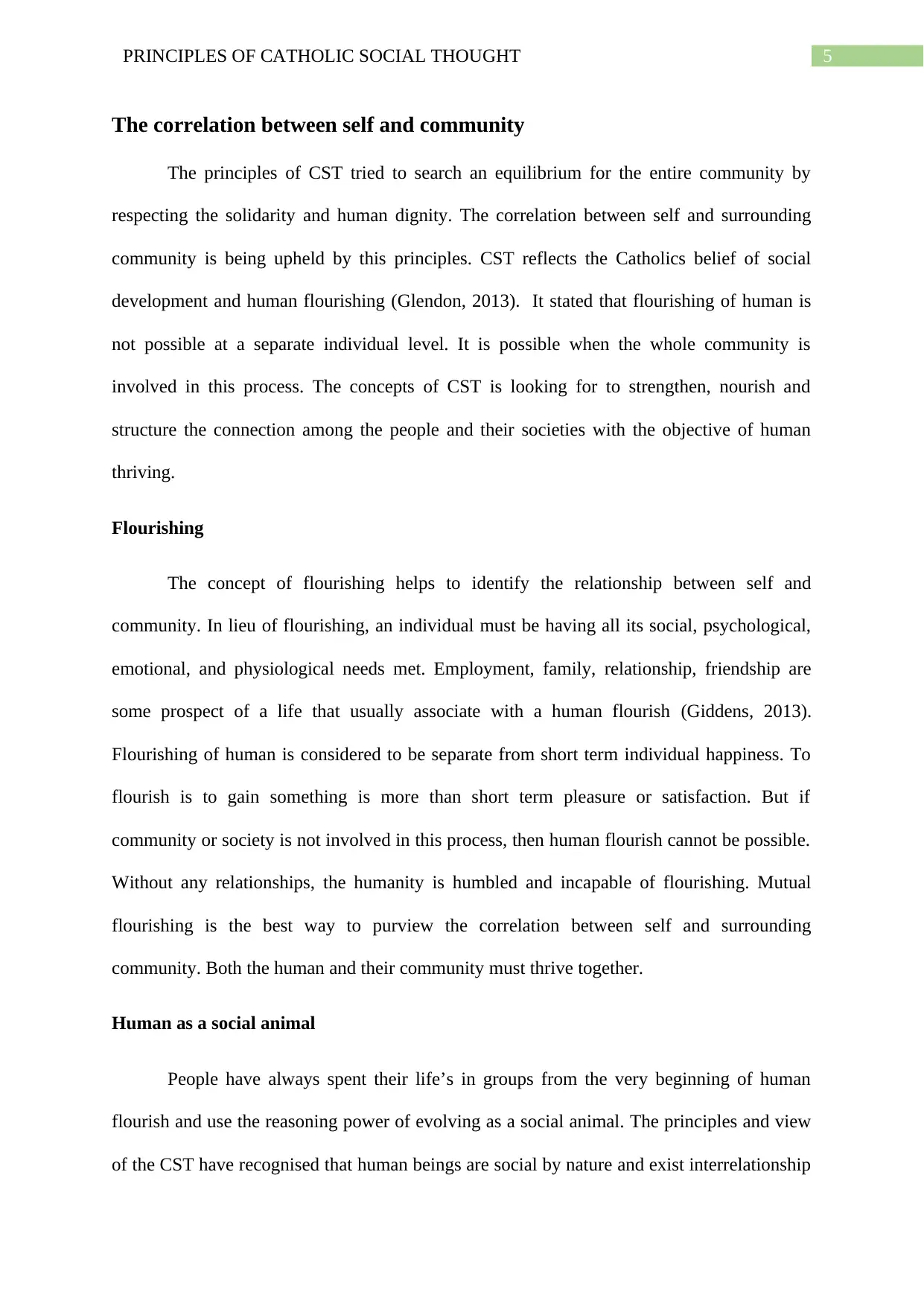
5PRINCIPLES OF CATHOLIC SOCIAL THOUGHT
The correlation between self and community
The principles of CST tried to search an equilibrium for the entire community by
respecting the solidarity and human dignity. The correlation between self and surrounding
community is being upheld by this principles. CST reflects the Catholics belief of social
development and human flourishing (Glendon, 2013). It stated that flourishing of human is
not possible at a separate individual level. It is possible when the whole community is
involved in this process. The concepts of CST is looking for to strengthen, nourish and
structure the connection among the people and their societies with the objective of human
thriving.
Flourishing
The concept of flourishing helps to identify the relationship between self and
community. In lieu of flourishing, an individual must be having all its social, psychological,
emotional, and physiological needs met. Employment, family, relationship, friendship are
some prospect of a life that usually associate with a human flourish (Giddens, 2013).
Flourishing of human is considered to be separate from short term individual happiness. To
flourish is to gain something is more than short term pleasure or satisfaction. But if
community or society is not involved in this process, then human flourish cannot be possible.
Without any relationships, the humanity is humbled and incapable of flourishing. Mutual
flourishing is the best way to purview the correlation between self and surrounding
community. Both the human and their community must thrive together.
Human as a social animal
People have always spent their life’s in groups from the very beginning of human
flourish and use the reasoning power of evolving as a social animal. The principles and view
of the CST have recognised that human beings are social by nature and exist interrelationship
The correlation between self and community
The principles of CST tried to search an equilibrium for the entire community by
respecting the solidarity and human dignity. The correlation between self and surrounding
community is being upheld by this principles. CST reflects the Catholics belief of social
development and human flourishing (Glendon, 2013). It stated that flourishing of human is
not possible at a separate individual level. It is possible when the whole community is
involved in this process. The concepts of CST is looking for to strengthen, nourish and
structure the connection among the people and their societies with the objective of human
thriving.
Flourishing
The concept of flourishing helps to identify the relationship between self and
community. In lieu of flourishing, an individual must be having all its social, psychological,
emotional, and physiological needs met. Employment, family, relationship, friendship are
some prospect of a life that usually associate with a human flourish (Giddens, 2013).
Flourishing of human is considered to be separate from short term individual happiness. To
flourish is to gain something is more than short term pleasure or satisfaction. But if
community or society is not involved in this process, then human flourish cannot be possible.
Without any relationships, the humanity is humbled and incapable of flourishing. Mutual
flourishing is the best way to purview the correlation between self and surrounding
community. Both the human and their community must thrive together.
Human as a social animal
People have always spent their life’s in groups from the very beginning of human
flourish and use the reasoning power of evolving as a social animal. The principles and view
of the CST have recognised that human beings are social by nature and exist interrelationship
⊘ This is a preview!⊘
Do you want full access?
Subscribe today to unlock all pages.

Trusted by 1+ million students worldwide
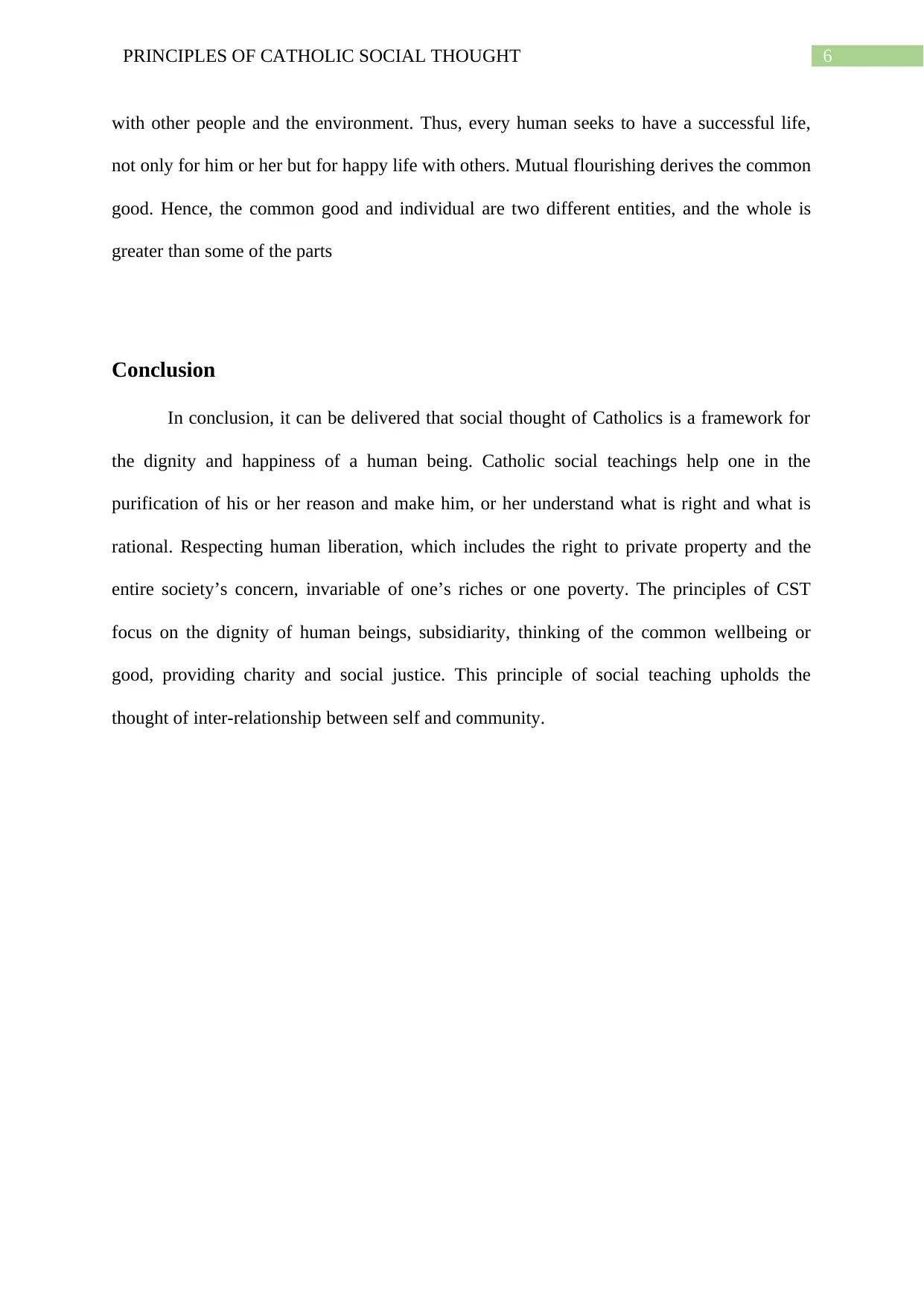
6PRINCIPLES OF CATHOLIC SOCIAL THOUGHT
with other people and the environment. Thus, every human seeks to have a successful life,
not only for him or her but for happy life with others. Mutual flourishing derives the common
good. Hence, the common good and individual are two different entities, and the whole is
greater than some of the parts
Conclusion
In conclusion, it can be delivered that social thought of Catholics is a framework for
the dignity and happiness of a human being. Catholic social teachings help one in the
purification of his or her reason and make him, or her understand what is right and what is
rational. Respecting human liberation, which includes the right to private property and the
entire society’s concern, invariable of one’s riches or one poverty. The principles of CST
focus on the dignity of human beings, subsidiarity, thinking of the common wellbeing or
good, providing charity and social justice. This principle of social teaching upholds the
thought of inter-relationship between self and community.
with other people and the environment. Thus, every human seeks to have a successful life,
not only for him or her but for happy life with others. Mutual flourishing derives the common
good. Hence, the common good and individual are two different entities, and the whole is
greater than some of the parts
Conclusion
In conclusion, it can be delivered that social thought of Catholics is a framework for
the dignity and happiness of a human being. Catholic social teachings help one in the
purification of his or her reason and make him, or her understand what is right and what is
rational. Respecting human liberation, which includes the right to private property and the
entire society’s concern, invariable of one’s riches or one poverty. The principles of CST
focus on the dignity of human beings, subsidiarity, thinking of the common wellbeing or
good, providing charity and social justice. This principle of social teaching upholds the
thought of inter-relationship between self and community.
Paraphrase This Document
Need a fresh take? Get an instant paraphrase of this document with our AI Paraphraser
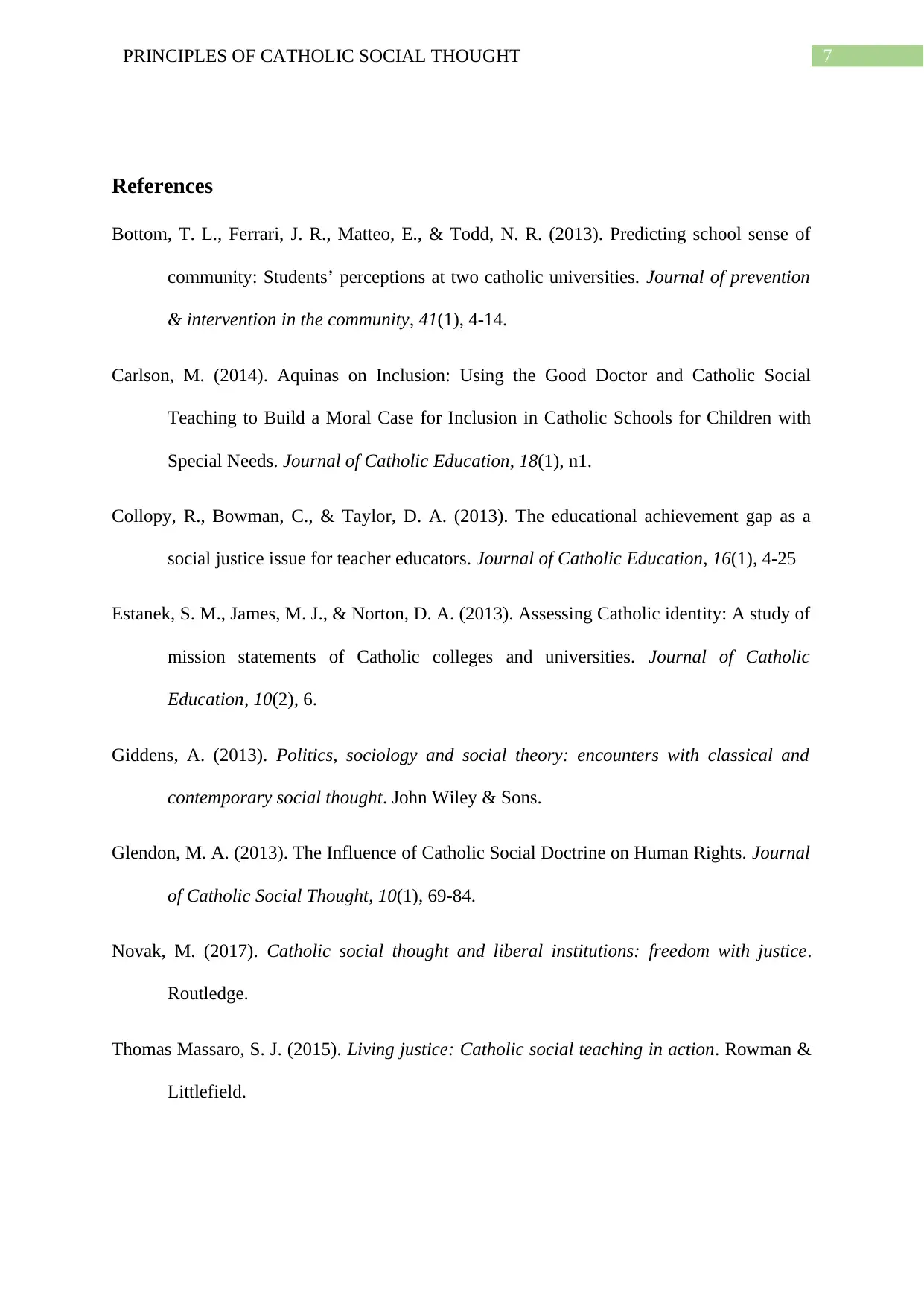
7PRINCIPLES OF CATHOLIC SOCIAL THOUGHT
References
Bottom, T. L., Ferrari, J. R., Matteo, E., & Todd, N. R. (2013). Predicting school sense of
community: Students’ perceptions at two catholic universities. Journal of prevention
& intervention in the community, 41(1), 4-14.
Carlson, M. (2014). Aquinas on Inclusion: Using the Good Doctor and Catholic Social
Teaching to Build a Moral Case for Inclusion in Catholic Schools for Children with
Special Needs. Journal of Catholic Education, 18(1), n1.
Collopy, R., Bowman, C., & Taylor, D. A. (2013). The educational achievement gap as a
social justice issue for teacher educators. Journal of Catholic Education, 16(1), 4-25
Estanek, S. M., James, M. J., & Norton, D. A. (2013). Assessing Catholic identity: A study of
mission statements of Catholic colleges and universities. Journal of Catholic
Education, 10(2), 6.
Giddens, A. (2013). Politics, sociology and social theory: encounters with classical and
contemporary social thought. John Wiley & Sons.
Glendon, M. A. (2013). The Influence of Catholic Social Doctrine on Human Rights. Journal
of Catholic Social Thought, 10(1), 69-84.
Novak, M. (2017). Catholic social thought and liberal institutions: freedom with justice.
Routledge.
Thomas Massaro, S. J. (2015). Living justice: Catholic social teaching in action. Rowman &
Littlefield.
References
Bottom, T. L., Ferrari, J. R., Matteo, E., & Todd, N. R. (2013). Predicting school sense of
community: Students’ perceptions at two catholic universities. Journal of prevention
& intervention in the community, 41(1), 4-14.
Carlson, M. (2014). Aquinas on Inclusion: Using the Good Doctor and Catholic Social
Teaching to Build a Moral Case for Inclusion in Catholic Schools for Children with
Special Needs. Journal of Catholic Education, 18(1), n1.
Collopy, R., Bowman, C., & Taylor, D. A. (2013). The educational achievement gap as a
social justice issue for teacher educators. Journal of Catholic Education, 16(1), 4-25
Estanek, S. M., James, M. J., & Norton, D. A. (2013). Assessing Catholic identity: A study of
mission statements of Catholic colleges and universities. Journal of Catholic
Education, 10(2), 6.
Giddens, A. (2013). Politics, sociology and social theory: encounters with classical and
contemporary social thought. John Wiley & Sons.
Glendon, M. A. (2013). The Influence of Catholic Social Doctrine on Human Rights. Journal
of Catholic Social Thought, 10(1), 69-84.
Novak, M. (2017). Catholic social thought and liberal institutions: freedom with justice.
Routledge.
Thomas Massaro, S. J. (2015). Living justice: Catholic social teaching in action. Rowman &
Littlefield.
1 out of 8
Related Documents
Your All-in-One AI-Powered Toolkit for Academic Success.
+13062052269
info@desklib.com
Available 24*7 on WhatsApp / Email
![[object Object]](/_next/static/media/star-bottom.7253800d.svg)
Unlock your academic potential
Copyright © 2020–2026 A2Z Services. All Rights Reserved. Developed and managed by ZUCOL.




